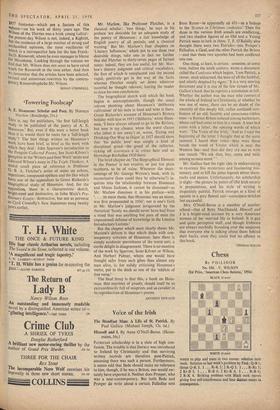'Towering Foolscap'
A. E. Housman: Scholar and Poet. By Norman Marlow. (Routledge, 21s.) Tilts is, say the publishers, 'the first full-length study to be published of the poetry of A. E. Housman.' But, even if this were a better book than it is, would there be room for a 'full-length study'? The best things written on Housman's Work have been brief, as brief as the work with Which they deal : John Sparrow's introduction to the Penguin Collected Poems, Ian Scott-Kilvert's Pamphlet in the 'Writers and their Work' series and Edmund Wilson's essay in. The Triple Thinkers. A useful small piece of reference is Professor G. B. A. Fletcher's series of notes on echoes, repetitions, compound-epithets and the like which form one of the appendices to Grant Richards's biographical study, of Housman. And, for the °PPosition, there is a characteristic sketch, bright-eyed and destructive, in John Wain's Pre- liminary Essays: destructive, but not as perverse as Cyril Connolly's New Statesman essay twenty Years earlier. Mr. Marlow, like Professor Fletcher, is a classical scholar : 'two things,' he says in his preface 'are desirable for an adequate study of the poetry of Housman : a fair knowledge of English poetry of all periods, and a classical training.' But Mr. Marlow's four chapters on `Literary Influences,' which put to use these two desirable things, take one in fact no further that did Fletcher in thirty-seven pages of factual notes; indeed, they are less useful, for Mr. Mar- low's literary judgment and critical vocabulary, the first of which is complacent and the second vapid, positively get in the way of the facts, whereas Fletcher simply set down whatever material he thought relevant, leaving the reader to draw his own conclusions. The biographical sketch with which the book begins is unexceptionable, though the usual solemn plonking about Housman's 'deliberate cultivation' of his taste in food and wine is there. Grant Richards's account of Housman's Riviera holiday with him in 1915 (`Hitherto,' wrote Hous- man, `I have always refused to go to the Riviera; but now is my chance, when the worst classes who infest it are away') or, worse, 'Eating and Drinking Our Way to Dijon' in 1927 should show that 'his public love' was simply a kind of disciplined greed—the greed of the collector, ticking off ecrevisses a la creme here and an Hermitage Rochefine 1920 there.
The brief chapter on 'The Biographical Element in the Poems' is too evasive, or just too plain stubborn, to be of value. Whatever the short- comings of Mr. George Watson's book, with its inconclusive (how could they be otherwise?) in- quiries into the relationship between Housman and Moses Jackson, it cannot be dismissed—as Mr. Marlow dismisses it in his preface—with . . its main thesis, that Housman was an invert, was first propounded in 1936'; nor is one's faith in Mr. Marlow's judgment invigorated by the rhetorical `Surely we.should never have had from a mind that was anything but pure of stain the impassioned defence of knowledge in the London Introductory Lecture.'
But the chapter which most clearly shows Mr. Marlow's defects is that which deals with con- temporary criticism of Housman; here there is simply academic peevishness of the worst sort, a sterile delight in disagreement. There is no mention of the work by Sparrow, Scott-Kilvert or Wilson. And Herbert Palmer, whom one would have thought safer from such gibes than almost any man alive, is, for mildly criticising Housman's metre, put in the dock as one of the `addicts of free verse.'
The final irony is that this, a book on Hous- man, that martinet of proofs, should itself be so extraordinarily full of misprints and so cavalier in its reproduction of Housman's poems.
ANTHONY THWAITE














































 Previous page
Previous page